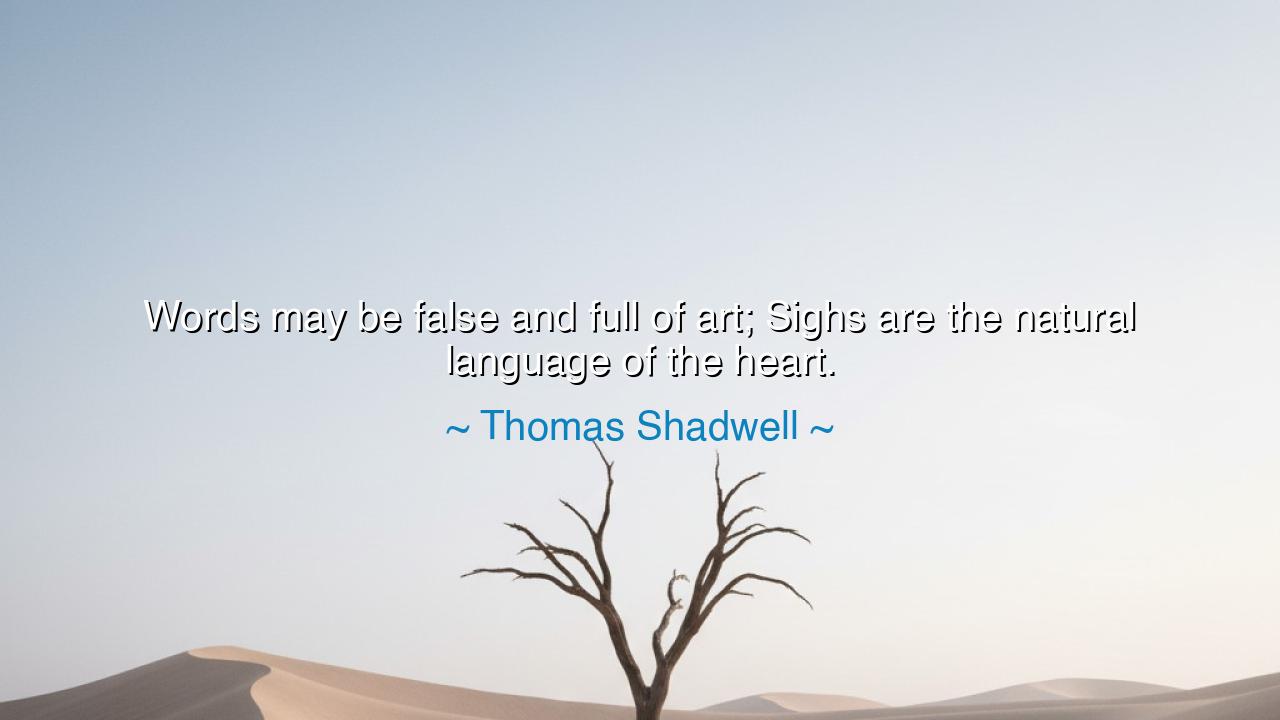
Words may be false and full of art; Sighs are the natural






"Words may be false and full of art; Sighs are the natural language of the heart." These words from Thomas Shadwell reach deep into the soul, calling us to reflect on the nature of truth, expression, and the language of the heart. In this world, words flow freely from the lips of man, often shaped by the cunning hands of artifice, designed to deceive or to charm. Yet, beneath these carefully constructed phrases, beneath the polished speeches and lofty declarations, there exists a language far older, far truer—the language of the heart, the language of sighs. For what can the mouth truly express, when the heart is torn and filled with emotions too vast for mere words to contain?
O seekers of wisdom, understand this: words are but vessels, fragile and fleeting. They can be bent and molded, twisted into shapes that serve our desires, but the truth of the soul, the true essence of the heart, cannot be fully captured by them. The great orators of old, like Cicero and Demosthenes, could move the masses with the power of their speech, yet even their words were often but a shadow of the truth that lay deep within their hearts. Words can be false—manipulated for gain, for power, or for the pleasure of pleasing others. Yet, sighs, those quiet, unspoken breaths, carry with them the raw truth of our inner selves. They are the language of the heart, a language that needs no translation, for all who hear it recognize its authenticity.
Consider the story of Antoine de Saint-Exupéry, the great writer of The Little Prince. It is said that he was once a pilot, flying over the vast, endless desert, when he came upon a young boy, a stranger in the middle of nowhere. The boy spoke not with words, but with sighs, with gestures, with eyes that spoke of longing and yearning. The connection they shared in that fleeting moment was not through the speeches they could have given, but through the language of sighs, the silent communication of two souls understanding each other beyond the limits of speech. In that shared silence, the heart of the pilot recognized the heart of the boy. It was not the artifice of words that connected them, but the truth of their sighs—the natural, unguarded language of the heart.
There is power in silence, O children of the earth, a power greater than that of a thousand well-chosen words. The great sages and mystics, from the Buddha to the ancient Greek philosophers, spoke not only with their lips but with their hearts. They understood that the language of the heart is one of sighs and gestures, a language that transcends the limitations of the spoken word. When Plato spoke of the soul, he did not do so with mere rhetoric. He spoke with the weight of lived experience, the silent language of the heart that echoed through his philosophy. And so, too, must we learn to listen to the sighs of those around us—the gestures, the unspoken emotions, the silent cries that speak louder than words ever could.
Reflect upon the great Queen Cleopatra, whose heart was said to be filled with both passion and ambition. Though she spoke in the finest tongues of Egypt and Rome, it is said that it was not her words that captivated Julius Caesar and Mark Antony, but her very presence. Her sighs, the weight of her gaze, the way she moved—these were the true expressions of her heart. She knew the power of silence, for sometimes a sigh carries more meaning than a thousand speeches. It is in the quietest moments, when words fall away, that the deepest truths are revealed. Love, sorrow, hope, and despair—all find their voice in the sighs we give, the silences we keep, and the spaces between our spoken words.
So, O children of the future, listen closely to the sighs of those around you, for they are the true language of the heart. In a world full of artificial chatter, of words spoken to impress or deceive, do not be fooled. The truth lies not in the cleverness of speech, but in the honesty of the heart. When you find yourself overwhelmed with emotion, when words fail to capture the depth of your feelings, remember that a single sigh can say more than all the grand speeches ever made. Love, grief, longing—all these find their most honest expression in the language of the heart, the language of sighs.
And let this lesson guide you in your own life: do not be quick to judge the words of others, for they may be carefully crafted illusions. Instead, look deeper, listen to the unspoken, and feel the truth beneath the surface. When you speak, let your words be guided not by artifice, but by the sincerity of your heart. And when words fail, let your sighs, your silences, and your presence speak what cannot be captured by any tongue. For in the end, it is not the beauty of the words we speak, but the authenticity of the heart that truly matters.






AAdministratorAdministrator
Welcome, honored guests. Please leave a comment, we will respond soon